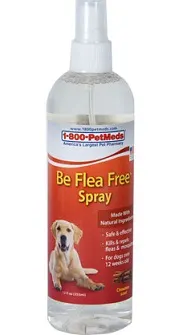I use chemical flea-prevention products on my dog, and I feel bad about it.
When I lived in North Dakota, I never had to worry about fleas. (A benefit of brutally cold weather.)
But fleas are a year-round problem here in San Diego, so I want to start an honest discussion about fleas.
There’s a lot of talk about natural flea prevention lately, and of course that’s a good thing. But what if those options aren’t possible?
Why I use chemical flea prevention on my pets

My approach to flea prevention is to use the least amount of toxic chemicals as possible while keeping my pets flea free.
I use chemical flea-prevention products on my pets because:
- Fleas are a big problem in my area.
- I can’t use natural flea-prevention products because of allergies to the ingredients (cedarwood oil, peppermint oil, sage, thyme oil, etc.)
I typically buy flea-prevention products through 1-800-PetMeds. The company recently gave me some store credit, and my last order included Advantage for the cats and K9 Advantix for Ace.
What are the potential risks of chemical flea prevention products?
Chemical flea prevention products are made with insecticides. You know, like, toxic poisons. It’s not rocket science to figure out that these could be harmful, especially over the long term.
An active ingredients in Frontline is an insecticide called fipronil. An active ingredient in K9 Advantix is an insecticide called imidacloprid.
I’m not picking on these brands. I use them regularly on my pets. I just want pet owners to think carefully about whether these products are truly necessary and how often they should be used.
Potential side effects are listed right on the packaging. For example, Advantage and K9 Advantix list that the products could cause skin irritation or gastrointestinal issues.
I’ve never noticed these types of reactions from my pets.
Instead, I’m more concerned about the potential toll these chemicals could take on my pets over time.
While it’s impossible to avoid all toxins (they’re pretty much everywhere), I believe we should do all we can to limit what our families and our pets are exposed to. Spot-on flea treatments are just one example.
Natural flea prevention options
I love that there are so many natural options available for flea prevention, and I recommend you go that route if possible, even though it’s not an option for me.

Topical products without the chemicals
There are monthly, topical flea prevention products without harsh chemicals such as a brand called Natural Defense. This is made with peppermint oil and other natural ingredients harmless to pets and humans but deadly to fleas and ticks, according to the company.
Natural sprays
1-800-PetMeds carries a natural anti-flea spray made with cedarwood oil and peppermint oil. The company says it’s safe to use this product in addition to spot-on treatments.
Food grade diatomaceous earth
This can be sprinkled over the pet’s bedding. It’s safe for humans and pets but kills fleas and ticks by drying them out. I’ve also sprinkled a combo of salt and baking soda into my carpets to potentially kill flea eggs. I can’t say whether it actually worked, but it didn’t hurt.
What if you have to use chemical flea prevention?
Sometimes we have no choice but to use chemical flea prevention products. If that’s the case, there are still ways we can limit the toxins our pets are exposed to overall.
For example:
- If we have to give flea prevention and heartworm prevention, we don’t have to give them to the dog on the same day. We can spread them out. In some areas, dogs won’t even need heartworm prevention.
- We can give our pets the minimum amount of flea prevention necessary for our area. Perhaps once every six weeks instead of every four.
- We can rotate between natural products and chemical products, assuming the natural products are effective.
- We can limit which vaccinations our pets receive so they only get the vaccines that are truly necessary.
- We can use natural cleaning products in the home whenever possible.
- We can feed our dogs a raw diet or the healthiest diet we can afford.
Now I want to hear from you.

Ashlee
Wednesday 18th of June 2014
I should also note that while I was talking about ticks in my above post, the concoction is supposed to keep fleas at bay too. We will see.
Ashlee
Wednesday 18th of June 2014
I do, but I'm not thrilled about it. I gave my mutt a dose of frontline when things finally started to heat up around here. Since then, I've been trying to find a solution to eliminate a chemical preventative from our home. I've read that vinegar diluted with water repels fleas and ticks, along with a variety of essential oils. I made a concoction of water, vinegar and peppermint oil and used it while we were traveling in the west and PNW the last two weeks. I didn't see any ticks on my mutt, but I don't know if the populations are that prevalent in the areas we were hiking in. We found ticks on some of the humans, but the mutt was clean. I noticed that the flies stayed away from her too. While we were gettig bit, they weren't landing on her. Maybe it is a coincidence. The true test, though, with be taking her into the Minnesota Northwoods. If it survives that, then call me a believer. :)
Lindsay Stordahl
Wednesday 18th of June 2014
You will have to let me know how it works in the woods in Minnesota!
Nicole
Tuesday 10th of June 2014
Hi there! I also live in Southern California and my pet-friendly community is a paradise for fleas. I have opted not to use any preventatives, as my dog is very sensitive to chemicals, and has had adverse reactions to the different treatments. I am having moderate success with the following regime: -I bathe my dog once per week with something called DERMagic Flea Bar. It is very mild, lathers well, and has DE in it. -After her bath, I comb a product called Cedarcide by Best Yet into her dry fur. It is concentrated cedar oil. This prevents new fleas from jumping on her during walks and has been very effective for me. I apply this to her fur every few days between baths. -I take 5 minutes to flea comb my dog every day in the evening after her last walk, just as an extra precaution. -My dog's bedding is very simple and easy to wash and change out. She sleeps in a crate and her bedding is just a pillow with a pillowcase. I wash and change the pillowcase once a week, shake out the pillow (outside) and stick it in the hot dryer for 30 minutes, and quickly wipe her kennel down with non-toxic cleaner. I also vacuum thoroughly at least once per week. With this regime, I have been able to keep the fleas away for the most part. I find about 2-3 fleas on my pup per week during the warmest months, but it's a quick dunk in some soapy water and they're done. This may not work for everyone, but if you have a few extra minutes per day, and don't have an existing infestation, the natural methods might help some owners avoid preventives altogether. :) *If your pup has flea allergies, I would say that preventives are best since the pros outweigh the cons in those cases.
Lindsay Stordahl
Tuesday 10th of June 2014
I appreciate those tips, especially since you live in a high-flea area as I do.
Stacey
Friday 6th of June 2014
I'm in Florida , so like you, I have to use chemical products part of the year. I use natural products during the winter but have to bump it up to chemical during the summer or risk infestation. I would love if something natural would work all year but nothing I have tried seems to control them during the Florida summer. So I use the chemicals because that seems the least of the two evils, chemicals or flea infestation.
weliveinaflat
Thursday 5th of June 2014
We use Frontline although I sometimes skip a month or two since I have never found a tick on Donna. That said, I recently read that some tick diseases could show no symptoms or be dormant for a while... so Donna is back on Frontline regularly again just in case :P
She's never really showed a bad reaction to frontline, although she gets weirdly hyper and can't stop running around for a bit immediately after I apply it. Not sure why - -
I probably need more research on natural products, a lot of this stuff appear to be hearsay and not really proven whether they truly are preventative or not. So I still stick to Frontline since I am at present no well-educated on the subject yet ;) But like you I am concerned about long term effects.